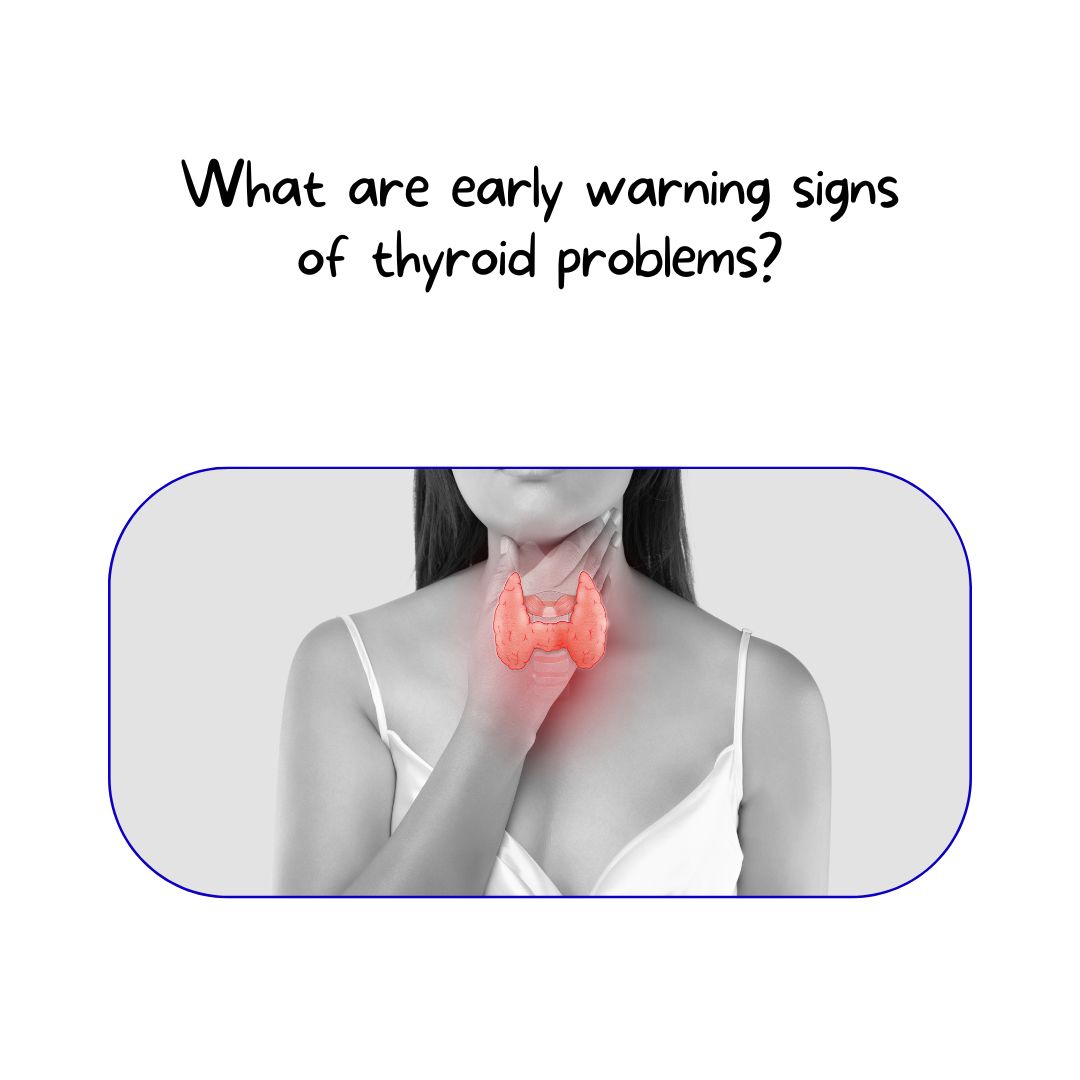What are early warning signs of thyroid problems?

What are the early warning signs of thyroid problems? The thyroid gland is a small butterfly-shaped organ located in the front of the neck. It is responsible for producing hormones that regulate various bodily functions, such as metabolism, heart rate, body temperature, and more.
The importance of the thyroid gland cannot be overstated, as it plays a vital role in keeping the body functioning optimally. Unfortunately, like any other organ, the thyroid gland can malfunction, leading to a host of health problems. This article will discuss the early warning signs of thyroid problems that individuals should watch out for.
Early detection of thyroid problems is critical in preventing further complications. The symptoms of thyroid problems may vary depending on whether the gland is overactive or underactive.
Symptoms of an underactive thyroid (Hypothyroidism)
Hypothyroidism occurs when the thyroid gland is not producing enough thyroid hormones. Some of the early warning signs of hypothyroidism include:
Fatigue and weakness: Individuals with hypothyroidism often feel sluggish, tired, and weak, even after getting adequate rest.
Weight gain: Hypothyroidism can lead to unexplained weight gain, as the body’s metabolism slows down.
Sensitivity to cold: Individuals with hypothyroidism may feel cold even in warm temperatures due to slowed metabolism.
Constipation: Hypothyroidism can cause digestive problems such as constipation.
Dry skin and hair: The skin and hair of individuals with hypothyroidism tend to be dry and brittle.
Muscle and joint pain: Hypothyroidism can cause muscle and joint pain, making it difficult to perform daily tasks.
Elevated blood cholesterol levels: Hypothyroidism can lead to high levels of cholesterol in the blood.
Depression and irritability: Hypothyroidism can cause depression, irritability, and mood swings.
Menstrual irregularities: Women with hypothyroidism may experience heavy or irregular periods.
Symptoms of an overactive thyroid (Hyperthyroidism)
Hyperthyroidism is the opposite of hypothyroidism, in which the thyroid gland produces too much thyroid hormone, causing a range of symptoms. The most common symptoms of hyperthyroidism include nervousness and anxiety, which can be accompanied by feelings of restlessness, irritability, and mood swings. Insomnia is also a common symptom, as it can be difficult to fall asleep or stay asleep due to the overactive thyroid.
Rapid heartbeat and palpitations are also common in hyperthyroidism, as the excess thyroid hormone can cause the heart to beat faster and harder than normal. Weight loss is another common symptom, even if the person has not changed their diet or exercise routine. This is because the excess thyroid hormone can increase the body’s metabolism, causing it to burn more calories than usual.
Increased appetite is also a symptom of hyperthyroidism, as the body is using up more energy than usual and needs more fuel to function. Heat intolerance and excessive sweating are also common symptoms, as the body is working harder and generating more heat. Muscle weakness can also occur, as the excess thyroid hormone can cause the muscles to break down more quickly than usual.
Changes in the menstrual cycle can also be a symptom of hyperthyroidism, as the excess thyroid hormone can interfere with the normal functioning of the reproductive system. Women with hyperthyroidism may experience lighter or less frequent periods, or their periods may stop altogether. Men may experience a decrease in fertility or a decrease in sex drive.
Other possible signs and symptoms of thyroid problems
In addition to the symptoms of hypothyroidism and hyperthyroidism, there are other signs and symptoms that could indicate a problem with the thyroid gland. One of these is swelling in the neck, which can be a sign of an enlarged thyroid gland or a thyroid nodule. Hoarseness, difficulty swallowing, and a choking sensation can also occur if the thyroid gland is enlarged and pressing on the windpipe or esophagus.
Changes in hair texture, such as hair that becomes dry, brittle, or falls out more easily, can also be a sign of thyroid problems. Changes in taste and smell can occur due to hormonal changes associated with thyroid dysfunction. Vision problems, including double vision or vision loss, can occur if the thyroid gland is pressing on the optic nerve. Skin thickening and discoloration can occur in a condition called myxedema, which is a severe form of hypothyroidism.
Risk factors for thyroid problems
Several risk factors can increase the likelihood of developing thyroid problems. A family history of thyroid disease increases the risk of developing the condition, as does being female. Age is also a risk factor, as thyroid problems are more common in people over the age of 60.
Autoimmune disorders such as Hashimoto’s thyroiditis and Graves’ disease increase the risk of developing thyroid problems. Exposure to radiation, particularly during childhood, also increases the risk of developing thyroid cancer.
When to see a doctor?
It is important to be aware of the potential symptoms of thyroid problems and to seek medical advice if any symptoms persist. Regular thyroid screening is recommended for people over the age of 35, or for those with a family history of thyroid problems or other risk factors.
Symptoms that warrant a doctor’s visit include unexplained weight gain or loss, fatigue, hair loss, changes in bowel habits, changes in the menstrual cycle, and any unusual swelling in the neck. Diagnostic tests for thyroid problems include blood tests to check thyroid hormone levels, ultrasound to assess the size and shape of the thyroid gland, and biopsy to assess any nodules or lumps on the gland.
Conclusion:
The thyroid gland is an essential part of the body’s endocrine system, producing hormones that regulate metabolism, growth, and development. Thyroid problems can cause a range of symptoms, including fatigue, weight changes, sensitivity to temperature, constipation, dry skin and hair, muscle and joint pain, nervousness and anxiety, rapid heartbeat, palpitations, weight loss, increased appetite, heat intolerance, sweating, muscle weakness, changes in menstrual
One Comment